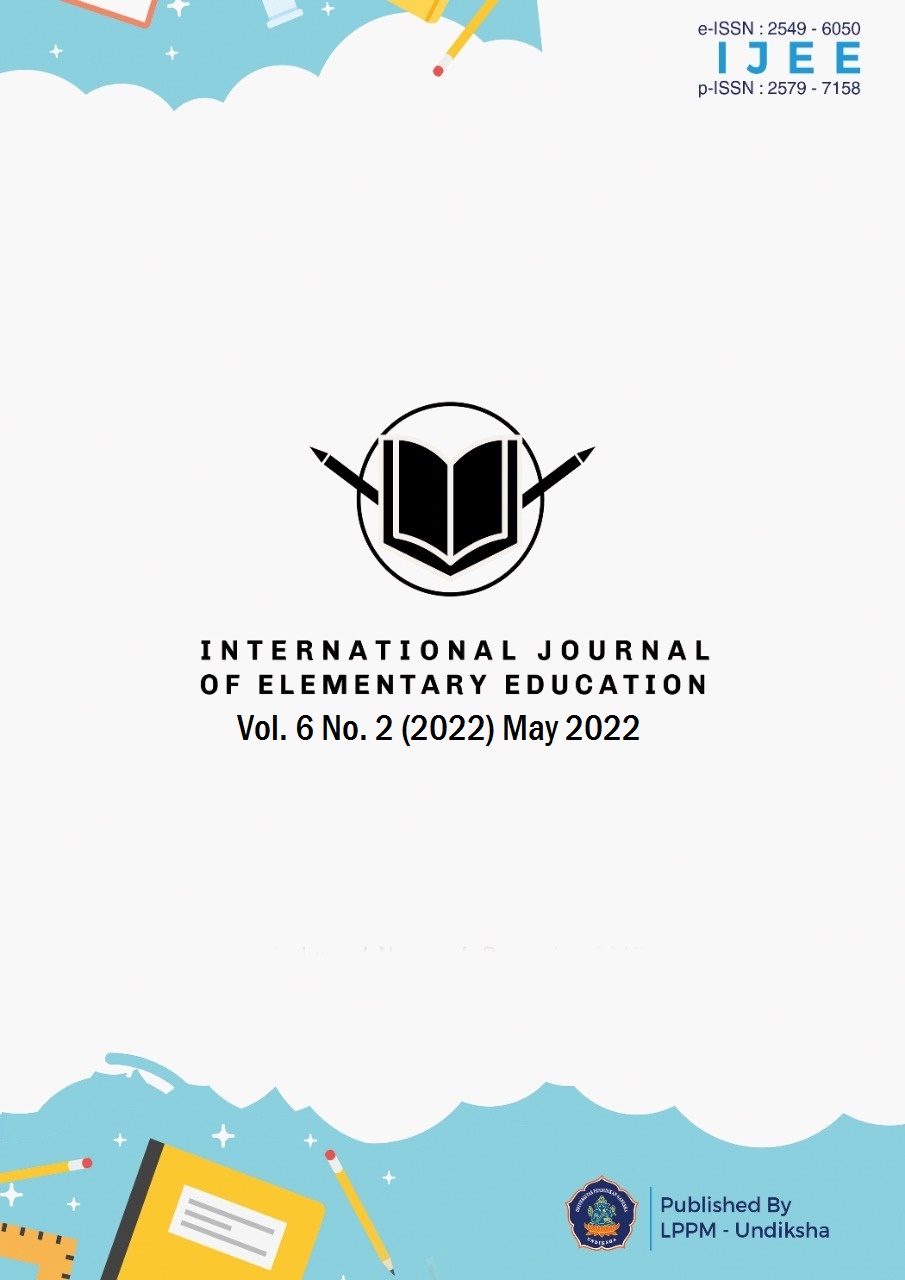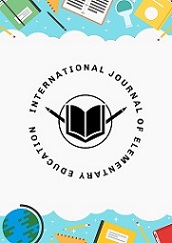Teacher as a Motivator: Gender, Ownership of Educator Certificates, and Age of Elementary Teachers in Improving Student Motivation during Online Learning
DOI:
https://doi.org/10.23887/ijee.v6i2.47137Keywords:
Teacher, Motivator, Gender, Certification, AgeAbstract
The online learning process during the Covid-19 pandemic tends to be more difficult and makes the students' motivation in elementary school low. Elementary school teachers have an important role in increasing and maintaining student motivation during the online learning process. This study aims to describe the role of teachers in terms of gender, ownership of educator certificates, and teacherage in increasing student motivation during online learning. The method used in this research is a descriptive method with quantitative data analysis techniques. Respondents in this study were elementary school teachers, as many as 11 people. Determination of the sample using a saturated sampling technique. The data collection method in this study was a questionnaire. The questionnaire consisted of 15 questions referring to 5 aspects of the teacher as a motivator. There are differences in the teacher's role as a motivator regarding gender, ownership of educator certificates, and teacherage. The results showed that elementary school teachers had tried to motivate students during online learning with a good dominant score. Unfortunately, some aspects are still in enough category, namely the indicators of giving reward-punishment, elements of the variation of the learning process, and aspects of using technology. The results also show that female teachers are better than male teachers, non-certified teachers are better than certified educators, and young teachers are better than older teachers.
References
Ahmad, Perwira Negara, H. R., Ibrahim, M., & Etmy, D. (2020). Pelatihan Pembelajaran Daring (Google Classroom) bagi Guru MTs dan MI Nurul Yaqin Kelanjur. JPMB : Jurnal Pemberdayaan Masyarakat Berkarakter, 3(1). https://doi.org/10.36765/jpmb.v3i1.224.
Ambarita, J., Jarwati, & Restiani, D. K. (2021). Pembelajaran Luring. Penerbit Adab.
Asmuni, A. (2020). Problematika Pembelajaran Daring di Masa Pandemi Covid-19 dan Solusi Pemecahannya. Jurnal Paedagogy, 7(4). https://doi.org/10.33394/jp.v7i4.2941.
Blaine, A. M. (2019). Interaction and presence in the virtual classroom: An analysis of the perceptions of students and teachers in online and blended Advanced Placement courses. Computers and Education, 132(January), 31–43. https://doi.org/10.1016/j.compedu.2019.01.004.
Dewi, W. A. F. (2020). Dampak Covid-19 terhadap Implementasi Pembelajaran Daring di Sekolah Dasar. Edukatif : Jurnal Ilmu Pendidikan, 2(1). https://doi.org/10.31004/edukatif.v2i1.89.
Diana, P. N., & Mampouw, H. L. (2019). Deskripsi Pedagogical Content Knowledge Guru Matematika Ditinjau dari Perbedaan Gender. Jurnal Cendekia : Jurnal Pendidikan Matematika, 3(1). 10.31004/cendekia.v3i1.81.
Emda, A. (2018). Kedudukan Motivasi Belajar Siswa dalam Pembelajaran. Lantanida Journal, 5(2). https://doi.org/10.22373/lj.v5i2.2838.
Fadilla, A. N., Relawati, A. S., & Ratnaningsih, N. (2021). Problematika Pembelajaran Matematika Daring di Masa Pandemi Covid-19. Jurnal Jendela Pendidikan, 01(02), 48–60. https://www.ejournal.jendelaedukasi.id/index.php/JJP/article/view/6.
Filgona, J., Sakiyo, J., Gwany, D. M., & Okoronka, A. U. (2020). Motivation in Learning. Asian Journal of Education and Social Studies. https://doi.org/10.9734/ajess/2020/v10i430273.
Gong, J., Lu, Y., & Song, H. (2018). The effect of teacher gender on students’ academic and noncognitive outcomes. Journal of Labor Economics, 36(3), 743–778. https://doi.org/10.1086/696203.
Haider, A., & Jalal, S. (2018). Good Teachers and Teaching through the lens of students International Journal of Research Good Teacher and Teaching through the Lens of Students. 05(07). https://edupediapublications.org/journals.
Hasmiah, H. (2020). Dampak Sertifikasi Terhadap Peningkatan Kualitas Mengajar Guru Di SD Negeri Kompleks IKIP Kota Makassar. JEKPEND: Jurnal Ekonomi dan Pendidikan, 3(1), 37. https://doi.org/10.26858/jekpend.v3i1.12003.
Ihwanah, A. (2020). Problematika Pembelajaran Daring di Sekolah Dasar Pada Era pandemi Covid-19. Journal of Islamic Education at Elementary School, 1(2). https://doi.org/10.47400/jiees.v1i2.15.
Johnson, D. (2017). The Role of Teachers in Motivating Students To Learn Davion Johnson. Journal of Graduate Studies in Education, 9(1), 46–49. https://files.eric.ed.gov/fulltext/EJ1230415.pdf.
Juliawan, I. W., Bawa, P. W., & Qondias, D. (2021). Dampak Covid-19 terhadap Implementasi Pembelajaran Daring di Sekolah Dasar. Jurnal Ilmiah Pendidikan Citra Bakti, 8(2), 157–169. https://doi.org/10.38048/jipcb.v8i2.342.
Juliya, M., & Herlambang, Y. T. (2021). Analisis Problematika Pembelajaran Daring dan Pengaruhnya Terhadap Motivasi Belajar Siswa. Genta Mulia, XII(1). https://ejournal.stkipbbm.ac.id/index.php/gm/article/view/585.
Juwita, M., & Yudhyarta, D. Y. (2020). Pengaruh Sertifikasi terhadap Kedisiplinan Mengajar Guru di Sekolah Dasar Negeri 008 Tembilahan Hulu. ASATIZA: Jurnal Pendidikan, 1(1), 139–150. https://doi.org/10.46963/asatiza.v1i1.64.
Khoirunnisa, R., & Widiati, U. (2021). Teachers’ Leadership and Students’ Motivation to Learn English. Jurnal Pendidikan: Teori, Penelitian, dan Pengembangan, 5(11), 1671. https://doi.org/10.17977/jptpp.v5i11.14194.
Khurriyati, Y., Setiawan, F., & Mirnawati, L. (2021). Dampak Pembelajaran Daring Terhadap Hasil Belajar Siswa. Pendidikan Dasar, VIII(1), 91–104. http://dx.doi.org/10.30659/pendas.8.1.91-104.
Koswara, K., & Rasto, R. (2016). Kompetensi Dan Kinerja Guru Berdasarkan Sertifikasi Profesi. Jurnal Pendidikan Manajemen Perkantoran, 1(1), 61. https://doi.org/10.17509/jpm.v1i1.3269.
Lawrence, J. E., & Tar, U. A. (2018). Factors that influence teachers’ adoption and integration of ICT in teaching/learning process. Educational Media International, 55(1), 79–105. https://doi.org/10.1080/09523987.2018.1439712.
Liu, R., & Chiang, Y. L. (2019). Who is more motivated to learn? The roles of family background and teacher-student interaction in motivating student learning. Journal of Chinese Sociology, 6(1), 2–17. https://doi.org/10.1186/s40711-019-0095-z.
Lubis, A. H., & Dasopang, M. D. (2021). Online learning during the covid-19 pandemic: How is it implemented in elementary schools? Premiere Educandum : Jurnal Pendidikan Dasar dan Pembelajaran, 11(1), 120. https://doi.org/10.25273/pe.v11i1.8618.
Majzub, R. M., & Rais, M. M. (2010). Boys’ underachievement: Male versus female teachers. Procedia - Social and Behavioral Sciences, 7(C), 685–690. https://doi.org/10.1016/j.sbspro.2010.10.093.
Manizar, E. (2017). Peran Guru Sebagai Motivator Dalam Belajar. Tadrib: Jurnal Pendidikan Agama Islam, 1(2). http://jurnal.radenfatah.ac.id/index.php/Tadrib/article/view/1047.
Mariyani, D. A., & Rezania, V. (2021). Analisis Peran Guru dan Orang Tua dalam Pelaksanaan Pembelajaran Daring. Paedagoria: Jurnal Kajian, Penelitian dan Pengembangan Kependidikan, 12(2), 311–317. https://doi.org/10.31764/paedagoria.v12i2.4972.
Mayasari, L. I., & Kemal, I. (2020). The role of teachers in implementing distance learning in the middle of the covid-19 plague. Systematic Reviews in Pharmacy, 11(12), 1553–1557. https://doi.org/10.31838/srp.2020.12.228.
Meşe, E., Sevilen, Ç., & Info, A. (2021). Factors influencing EFL students’ motivation in online learning: A qualitative case study. Journal of Educational Technology & Online Learning, 4(1), 11–22. http://doi.org/10.31681/jetol.817680.
Misaghi, M., Tonioti, E., Batiz, E. C., & Santos, A. J. Dos. (2021). WhatsApp as a Tool for Integration and Motivation in Distance Education. Social Networking, 10(03), 29–43. https://doi.org/10.4236/sn.2021.103003.
Muhbar, F., & Rochmawati, D. H. (2019). Hubungan Antara Tingkat Stres Dengan Beban Kerja Guru Di Sekolah Luar Biasa. Jurnal Keperawatan Jiwa, 5(2), 82. https://doi.org/10.26714/jkj.5.2.2017.82-86.
Nassaji, H. (2015). Qualitative and descriptive research: Data type versus data analysis. In Language Teaching Research (Vol. 19, Nomor 2). https://doi.org/10.1177/1362168815572747.
Natsir, E. (2021). Problematika Guru dan Siswa dalam Proses Pembelajaran Daring pada Masa Pandemi Covid-19 di UPTD SMP Negeri 1 Parepare. Alma’Arief: Jurnal Pendidikan Sosial dan Budaya, 3(2), 101–110. https://doi.org/10.35905/almaarief.v3i2.2346.
Nurafrianti, S. S., Amalia, A. R., & Nurasiah, I. (2020). Analisis Peran Guru Sebagai Motivator Pada Pembelajaran IPS Siswa Kelas Tinggi Dalam Pembelajaran Daring. DIKDAS MATAPPA: Jurnal Ilmu Pendidikan Dasar, 3(2). https://doi.org/10.31100/dikdas.v3i2.671.
Oktiani, I. (2017). Kreativitas Guru dalam Meningkatkan Motivasi Belajar Peserta Didik. Jurnal Kependidikan, 5(2). https://doi.org/10.24090/jk.v5i2.1939.
Palupi. (2015). Pengaruh Faktor Usia Terhadap Minat dan Kemampuan Guru PPKn dalam Penggunaan TIK. Jurnal FKIP Unila. http://jurnal.fkip.unila.ac.id/index.php/JKD/article/view/9149.
Puteri, W. A., Maharani, D. A., & Wulandari, A. (2020). Penggunaan Media Audio Visual untuk Meningkatkan Motivasi Belajar Siswa Selama Masa Pandemi Covid-19 Pada SD N 1 Serayu Larangan. ABDIPRAJA (Jurnal Pengabdian kepada Masyarakat), 1(1). https://doi.org/10.31002/abdipraja.v1i1.3146.
Putri, R. D. P., & Suyadi, S. (2021). Problematika Pembelajaran Daring dalam Penerapan Kurikulum 2013 Tingkat Sekolah Dasar. Jurnal Basicedu, 5(5), 3912–3919. https://doi.org/10.31004/basicedu.v5i5.1442.
Rahman, F., Ali, I., Faiz, M., & Bibi, S. (2020). Impact of Teacher-Student Interaction on Student Motivation and Achievement. Globus Journal of Progressive Education, 10(2), 1–6. https://www.globusedujournal.in/wp-content/uploads/2020/05/GE-JD201-Fazal-1.pdf.
Riastini, P. N., Mahayanti, N. W. S., Suryadarma, I., & Wangid, M. N. (2021). Barriers to Elemantary School Teachers’ Professional Practice: Teachers’ Voice. Ilkogretim Online - Elementary Education Online, 20(1). https://doi.org/doi: 10.17051/ilkonline.2021.01.101.
Rosyidiana, H. (2021). Problematika Pembelajaran Daring Pada Mata Pelajaran Sains (IPA) Tingkat Dasar Di Masa Pandemi Covid-19. Jurnal Basicedu, 5(4), 1709–1716. https://doi.org/10.31004/basicedu.v5i4.948.
Sabaniah, S., Ramdhan, D. F., & Rohmah, S. K. (2021). Peran Guru dalam Pelaksanaan Pembelajaran Jarak Jauh di Tengah Wabah Covid - 19. Edunesia : Jurnal Ilmiah Pendidikan, 2(1). https://doi.org/10.51276/edu.v2i1.77.
Sadikin, A., & Hamidah, A. (2020). Pembelajaran Daring di Tengah Wabah Covid-19. BIODIK, 6(2). https://doi.org/10.22437/bio.v6i2.9759.
Saumi, N. N., Murtono, M., & Ismaya, E. A. (2021). Peran Guru Dalam Memberikan Motivasi Belajar Siswa Sekolah Dasar Pada Masa Pandemi COVID-19. Jurnal Educatio FKIP UNMA, 7(1), 149–155. https://doi.org/10.31949/educatio.v7i1.892.
Sugiyono, D. (2018). Metode penelitian kuatintatif , kualitatif dan R & D / Sugiyono. In Bandung: Alfabeta.
Sumarsono, P., Inganah, S., Iswatiningsih, D., & Husamah. (2020). Belajar dan Pembelajaran di Era Milenial. UMM Press.
Suratman, B., Wulandari, S. S., Nugraha, J., & Narmaditya, B. S. (2020). Does teacher certification promote work motivation and teacher performance? A lesson from Indonesia. International Journal of Innovation, Creativity and Change, 11(10), 516–525. https://www.ijicc.net/images/vol11iss10/111047_Suratman_2020_E_R.pdf.
Susilaningsih, S. &. (2013). Dampak Sertifikasi Guru Terhadap Peningkatan Kualitas Pembelajaran Peserta Didik (The Effect of Teacher Sertification Toward the Improvement of Students’ Learning Quality). Jurnal Pendidikan dan Kebudayaan, 19(4), 487–498. https://media.neliti.com/media/publications/139226-none-64f3d62c.pdf.
Susilawati, S., & Supriyatno, T. (2020). Online Learning Through WhatsApp Group in Improving Learning Motivation in the Era and Post Pandemic COVID -19. Jurnal Pendidikan: Teori, Penelitian, dan Pengembangan, 5(6), 852. https://doi.org/10.17977/jptpp.v5i6.13670.
Syarifudin, A. S. (2020). Impelementasi Pembelajaran Daring Untuk Meningkatkan Mutu Pendidikan Sebagai Dampak Diterapkannya Social Distancing. Jurnal Pendidikan Bahasa dan Sastra Indonesia Metalingua, 5(1), 31–34. https://doi.org/10.21107/metalingua.v5i1.7072.
Tjabolo, S. A., & Herwin. (2020). The Influence of Teacher Certification on the Performance of Elementary School Teachers in Gorontalo Province, Indonesia. International Journal of Instruction, 13(4), 347–360. https://doi.org/10.29333/iji.2020.13422a.
Wangid, M. N. (2021). Effect Of Gender And Department On Motivation, Self-Efficacy, And Perception As Teacher Of Pre-Service Teacher Students. Multicultural Education, 7(6), 6–8. https://doi.org/10.5281/zenodo.4902177.
Widikasih, P. A., Widiana, I. W., & Margunayasa, I. G. (2021). Online Learning Problems for Elementary School Students. Journal of Education Research and Evaluation, 5(3), 1–10. http://dx.doi.org/10.23887/jere.v5i3.34254.
Winarni, S., & Lismadiana. (2020). Kompetensi Guru Pendidikan Jasmani Olahraga dan Kesehatan Ditinjau dari Usia dan Jenis Sekolah (Physical Education Teacher Competencies Base On Age and Type of School). Jurnal Pendidikan Jasmani Indonesia, 16(1), 101–114. http://dx.doi.org/10.21831/jpji.v16i1.29639.
Winarsieh, I., & Rizqiyah, I. (2020). Peranan Guru dalam Pembelajaran Daring pada Masa Pandemi Covid-19. Indonesian Journal of Teacher Education, 1(4), 159–164. http://www.akrabjuara.com/index.php/akrabjuara/article/view/919.
Zellatifanny, C. M., & Mudjiyanto, B. (2018). Tipe Penelitian Deskripsi Dalam Ilmu Komunikasi. Diakom : Jurnal Media dan Komunikasi, 1(2), 83–90. https://doi.org/10.17933/diakom.v1i2.20.
Zulfatul Muhasanah, L. (2021). Perbedaan Gaya Mengajar Guru Laki-Laki dan Perempuan dalam Mengembangkan Minat Belajar Siswa pada Mata Pelajaran Rumpun Pendidikan Agama Islam di Kelas X dan Xi Madrasah Aliyah Negeri 2 Jember Tahun Ajaran 2017/2018. Auladuna : Jurnal Prodi Pendidikan Guru Madrasah Ibtidaiyah, 2(2). https://doi.org/10.36835/au.v2i2.423.
Zulfitri, H., Setiawati, N. P., & Ismaini. (2019). Pendidikan Profesi Guru (PPG) sebagai Upaya Meningkatkan Profesionalisme Guru. LINGUA: Jurnal Bahasa & Sastra, 19(2), 130–136. https://doi.org/ejournal.unsri.ac.id/index.php/lingua/article/view/11095.
Downloads
Published
How to Cite
Issue
Section
License
Copyright (c) 2022 I Gusti Ngurah Kade Angga Juliartawan, Putu Nanci Riastini

This work is licensed under a Creative Commons Attribution-ShareAlike 4.0 International License.
Authors who publish with the International Journal of Elementary Education agree to the following terms:
- Authors retain copyright and grant the journal the right of first publication with the work simultaneously licensed under a Creative Commons Attribution License (CC BY-SA 4.0) that allows others to share the work with an acknowledgment of the work's authorship and initial publication in this journal.
- Authors are able to enter into separate, additional contractual arrangements for the non-exclusive distribution of the journal's published version of the work (e.g., post it to an institutional repository or publish it in a book), with an acknowledgment of its initial publication in this journal.
- Authors are permitted and encouraged to post their work online (e.g., in institutional repositories or on their website) prior to and during the submission process, as it can lead to productive exchanges, as well as earlier and greater citation of published work. (See The Effect of Open Access)










